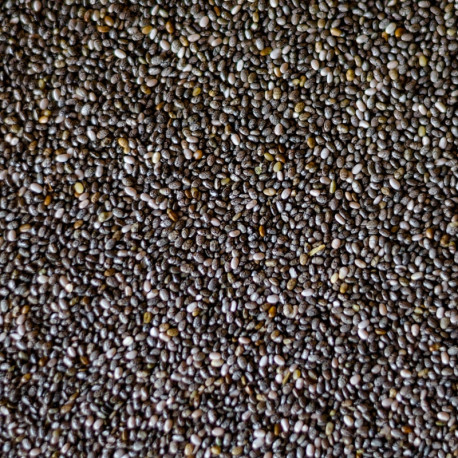- New




Reference: CHIA-VRAC-KG
Chia is a sage. It is an annual plant that can grow up to 1 m tall and whose scientific name is Salvia hispanica.
The composition of chia seeds is closely related to that of other mucilaginous seeds such as flaxseed and psyllium. Unlike flaxseed, however, chia does not present anti-nutritional factors, factors that limit the use of flaxseed without prior heat treatment. Anti-nutritional factors are cyanogenic glucosides or linatins, inhibitors of vitamin B6 that prevent its action. Chia also has a much more pleasant taste than flaxseed and is more likely to be eaten by birds.
Chia is a sage. It is an annual plant that can grow up to 1 m tall and whose scientific name is Salvia hispanica.
The composition of chia seeds is closely related to that of other mucilaginous seeds such as flaxseed and psyllium. Unlike flaxseed, however, chia does not present anti-nutritional factors, factors that limit the use of flaxseed without prior heat treatment. Anti-nutritional factors are cyanogenic glucosides or linatins, inhibitors of vitamin B6 that prevent its action. Chia also has a much more pleasant taste than flaxseed and is more likely to be eaten by birds.
Chia sage seeds are rich in flavonols (myricetol, querketol, kaempferol), flavonol glycosides, chlorogenic acids and caffeic acid.
{16}
Highlights: Chia seeds provide a good source of calcium and phosphorus and a very good source of dietary fiber and manganese.
Chia has good antioxidant activity provided by its polyphenols (chlorogenic acids, caffeic acids and flavonols).
These seeds rich in fat and protein are especially appreciated by wild birds. They will attract sizerins, finches, goldfinches, black-capped, sparrows, mourning doves and a host of other birds to your garden. It is often used as a replacement for the shuttle, which is more expensive.
Flaxseed is rich in omega 3, which is essential for the cardiovascular system.
Paddy rice seed or raw rice which is perfect for exotic big-beaked birds such as padda and birds of Asian descent. This seed is also appreciated by parakeets, parrots and exotic doves.
Thanks to its small black or pretty electric blue seeds, the poppy is recognizable among thousands. A cousin of the poppy, the poppy is known for its content of good fats and micronutrients essential for the proper functioning of the body.
They have the property of binding to minerals such as calcium, iron and zinc and making them less bioavailable.
Niger, bird seeds rich in phosphorus and calcium. Niger seeds (or nyjer seeds) are fine seeds rich in oil. They come from the Guizotia abyssinica (also known as Guizotia oleifera). Niger is highly favoured by most birds, with goldfinches and siskins being particularly fond of them.
Niger is one of the few bird seeds with a good calcium/phosphorus ratio.
Basil 1kg
Basil contains many antioxidants, is anti-inflammatory, and helps against stress. This does not mean that basil is considered a medicine. Dried basil is of course also different from fresh basil plants. But the fact remains: basil is good for health.
Carrot seeds are very rich in vitamins with a high proportion of vitamin A and carotene, as well as vitamin B, calcium and valuable carbohydrates.
These seeds, rich in fats and proteins, are particularly appreciated by wild birds. They will attract redpolls, grosbeaks, goldfinches, black-capped chickadees, sparrows, mourning doves, and a host of other birds to your garden. They are often used as a substitute for rapeseed, which is more expensive.
Flaxseed is composed of 40 to 45% oil and 25% protein. Flaxseed keeps very well. In particular, it contains two fatty acids with similar names (and whose root is the word "flax"), linolenic acid (an omega 3) and linoleic acid.
The seed is used in animal feed, especially for laying hens whose omega 3 content is to be increased.
Through these properties, this seed promotes digestion.
Millet contains magnesium, phosphorus, iron, potassium, manganese, vitamin A, vitamin B1, vitamin B2, vitamin PP (nicotinic acid) and vitamin B5.
Dimensions: 20kg
Chia is a sage. It is an annual plant that can reach 1 m in height, and its scientific name is Salvia hispanica.
The composition of the chia seed closely resembles that of other mucilaginous seeds like flaxseed and psyllium. Unlike flaxseed, chia does not have anti-nutritional factors, which limit the use of flaxseed without prior heat treatment. The anti-nutritional factors are cyanogenic glycosides or linatins, inhibitors of vitamin B6 that prevent its action. Chia also has a much more pleasant taste than flaxseed, and birds are more willing to consume it.
Niger, birdseed rich in phosphorus and calcium. Niger seeds (or nyjer seeds) are fine seeds rich in oil. They come from Guizotia abyssinica (also known as Guizotia oleiferous). The niger is highly prized by most birds, goldfinches and siskins love it.
The seed is mainly grown in India, Burma, Ethiopia and Nepal. Niger is an oilseed with a high fat content (38-43%) and protein content (23%). It provides quality food for all species of wild and forest birds, both in dry and sprouted form.
Niger is one of the few birdseeds with a good ratio of calcium to phosphorus.

Chia is a sage. It is an annual plant that can grow up to 1 m tall and whose scientific name is Salvia hispanica.
The composition of chia seeds is closely related to that of other mucilaginous seeds such as flaxseed and psyllium. Unlike flaxseed, however, chia does not present anti-nutritional factors, factors that limit the use of flaxseed without prior heat treatment. Anti-nutritional factors are cyanogenic glucosides or linatins, inhibitors of vitamin B6 that prevent its action. Chia also has a much more pleasant taste than flaxseed and is more likely to be eaten by birds.
